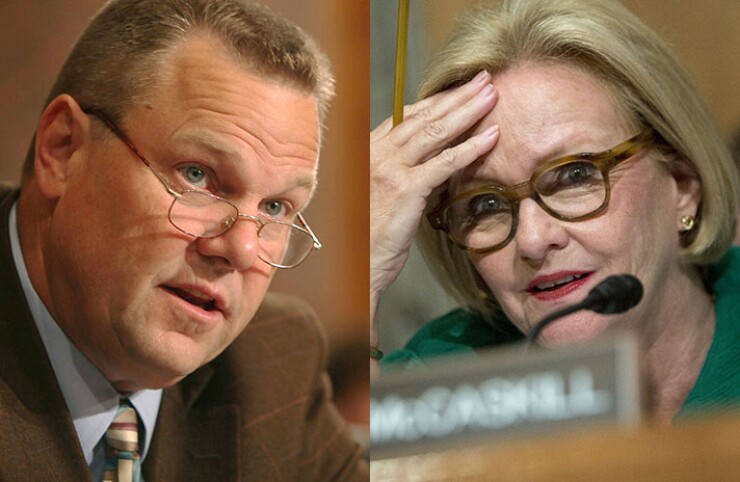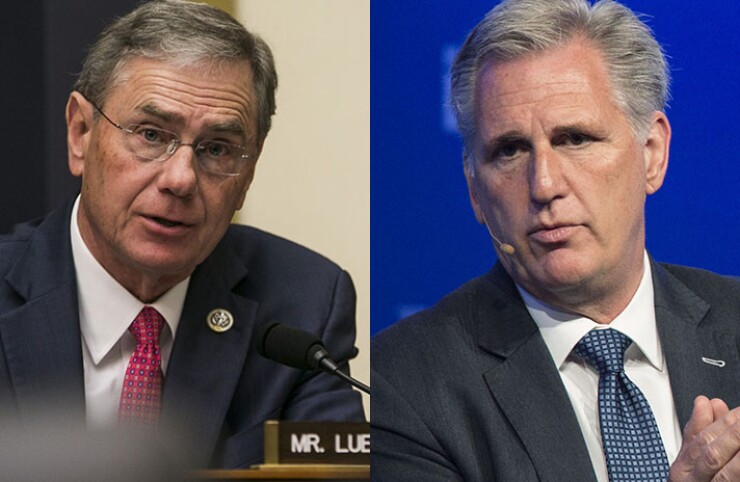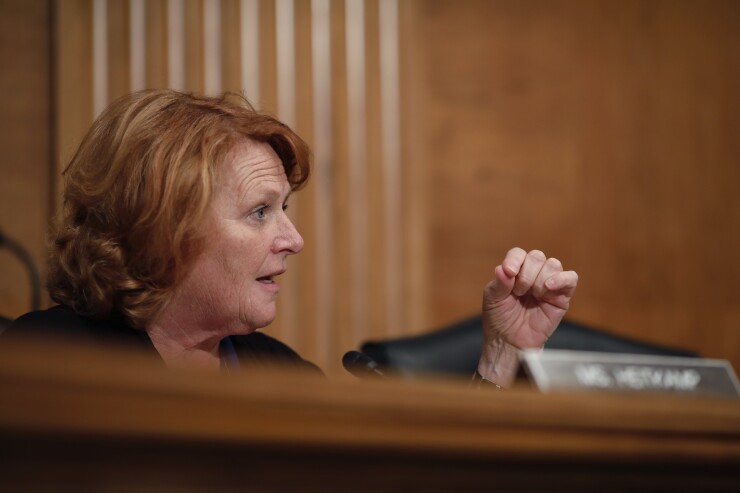WASHINGTON — While commercial banks in 2018 have continued their trend of contributing substantially more to Republicans than Democrats in congressional campaigns, moderate Democrats in the Senate are drawing more support from the industry this election cycle.
So far, for the 2018 election cycle, Republicans have received roughly $14 million in campaign contributions from the commercial banks, nearly twice as much as the $7.1 million Democrats have garnered so far, according to data from the Center for Responsive Politics, updated as of July 23. The data includes donations to both individual lawmakers and to the two parties as a whole.
But 2018 is shaping to be a unique election cycle for the banking industry, particularly in terms of Senate candidates getting the industry's financial backing. Significantly more Democrats are up for re-election in the Senate than Republicans, and bankers tend to give to incumbents.

Meanwhile, the midterm elections will come on the heels of the passage of a bill, known as S 2155, to ease certain provisions of the Dodd-Frank Act. Several Democratic incumbents in tight re-election races are moderates, trying to hold seats in states that President Trump won in 2016, who supported the reg relief bill.
“The banking industry has done a much better job of looking at members more holistically and reviewing their activity and involvement on important issues,” said a source close to the industry, who spoke on the condition of anonymity.
Of the top five Senate candidate recipients of commercial banking industry contributions, four are Democrats, according to the CRP's data. They are all defending seats in states that President Trump won in 2016: Jon Tester, D-Mont., Heidi Heitkamp, D-N.D., Joe Donnelly, D-Ind., and Claire McCaskill, D-Mo.

“When you think it through, there is always a tendency to give a bit more to incumbents,” said Charles Gabriel, president of the policy research firm Capital Alpha Partners.
And there are more Democratic Senate incumbents who have to defend their seats than Republicans. Twenty-six Democrats are defending their seats, including two Independents who caucus with the Democrats. Meanwhile, voters will go to the polls for only nine Senate seats currently held by a Republican, three of which will be an open seat.
Individual Democrats in the Senate have received on average $43,910 versus $31,468 for Republicans (including lawmakers not running for re-election). This data is from donations given to all sitting senators from individuals working at commercial banks (who gave $200 or more) and from the banks' political action committees.
The reg relief law was to a significant degree a bipartisan effort, with Senate Banking Committee Chairman Mike Crapo, R-Idaho, negotiating the package with a cohort of moderate Democrats on the panel, including Tester, Heitkamp and Donnelly. McCaskill also supported the final bill.
“They are the definition of moderate and as evidenced in S 2155,” said Isaac Boltansky, director of policy research at Compass Point Research & Trading. “They are willing to cut a deal. I think that banking interests are wise to support any elements on the Hill that are willing to come to the table and find a way to 'yes.' "
Still, as a whole, bankers are still more inclined to support the Republican Party than the Democratic Party, as evidenced by total donations. The last time Democrats received more from the industry than Republicans was in 1992, but by a slim $100,000 margin, not even 51%, according to the Center for Responsive Politics.
“I think financial services issues used to be largely outside of the normal political divisions as members of Congress prioritized issues that impacted their states over broader political impacts,” Boltansky said. “Since the crisis we have seen a much starker dividing line between the parties on financial services issues.”
Since the passage of the Dodd-Frank Act in 2010, Republicans have heavily surpassed Democrats in total contributions from the financial sector. However, the margin was starker during the 2012 congressional races than the current cycle. Republicans raked in $27 million from commercial banks while Democrats only saw $11 million in contributions from the sector in 2012, according to the Center for Responsive Politics.

“Bankers as an industry were pretty much solidly Republican and threw a great majority of their money toward Republicans,” said Camden Fine, the former head of the Independent Community Bankers of America.
Yet in 2018, the American Bankers Association and the ICBA have thrown the lion’s share of their donations toward incumbents. The Center for Responsive Politics has July 27 data showing incumbent candidates scoring close to 93% of the roughly $2 million in donations to candidates from ABA so for the 2018 cycle, while incumbents scored 97% of the more than $800,000 in candidate donations from the ICBA.
“We know what Senators Tester, Heitkamp and Donnelly, on financial services issues, how far they are going to do,” Boltansky said. “We do not know how far their opponents are going to go.”
Sen. Dean Heller, R-Nev., is also getting a decent share of commercial bankers’ funds. Heller, who also sits on the Banking Committee, is the only Republican in the Senate defending a seat in a state won by Hillary Clinton.
Another reason incumbents have an advantage in drawing donations from the banking industry is that they have the power to legislate and support initiatives in the current Congress.
“Regulatory reform does not stop with S 2155,” the industry source said. “Regulatory reform efforts will continue. BSA/AML issues, GSE reform, data breach[es] are important issues that require Congress’ attention.”
But Republicans still have a clear stronghold on donations in the 2018 House races. The top five House members seeking re-election in terms of donations from commercial banks are Republicans: Blaine Luetkemeyer, R-Mo., Patrick McHenry, R-N.C., Kevin McCarthy, R-Calif., Rep. French Hill, R-Ark., and Andy Barr, R-Ky.
“Based on policy positions, it’s probably going to continue to be the case” that Republicans will keep garnering the majority of bankers' donations," the industry source said. “The [minority] leaders of both the House Financial Services Committee and the Senate Banking Committee have shown limited interest in modifying or updating regulations or any parts of Dodd-Frank.”
House races also tend to be more locally focused as members have relationships with specific banks in their communities.
“One of the huge differences between the House and the Senate is that House races are much, much more local,” Fine said. “House districts are just in many cases just small slivers of a state. ... Each district is unique into itself and the banks make their judgment also on the local issues, as well as the national issues.”
When you look at contributions from the ABA and the ICBA, Republicans are still getting well over half the donations.
Nearly 75% of the ABA’s contributions toward congressional candidates in the 2018 cycle have so far gone toward Republican candidates, according to July 27 data from the Center for Responsive Politics. Roughly 65% of the candidate donations from the ICBA have gone toward Republicans.
Three of the four biggest banks — Bank of America, Wells Fargo and Citigroup — are still sending a majority of donations toward Republicans, including party organizations, according to data submitted to the center as of July 23. JPMorgan Chase is a slight outlier, contributing 50.5% more to Democratic candidates and party organizations.
Excluding party organizations, individual Democratic candidates have received more money from JPMorgan Chase and Wells Fargo in the 2018 cycle — about 57% from JPMorgan Chase and close to 54% from Wells Fargo, according to data updated by the CRP on July 27. Excluding donations to party organizations, Republican candidates are still getting more money from Bo A and Citi — about 51% from Bank of America and 58% from Citigroup.





